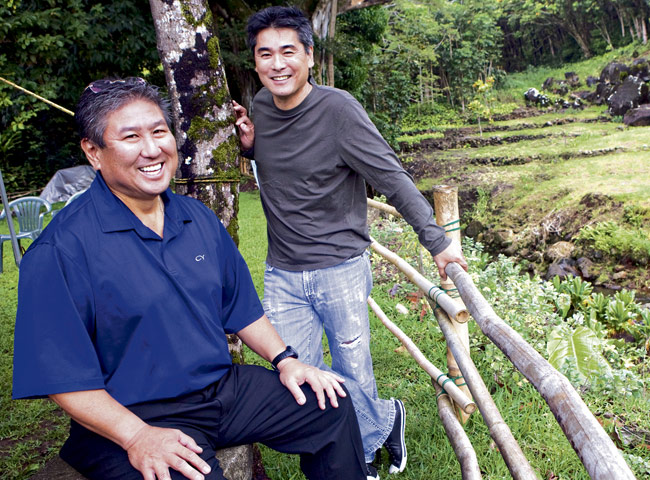Alan Wong
It is very possible that we would not be tasting the very best from chef Alan Wong (pictured below with Roy Yamaguchi) today had he not ventured outside of Hawaii at a young age.
Before we get to that, Wong credits the culinary program at Kapiolani Community College for opening his eyes to the kitchen. Prior to his enrollment at KCC, Wong had been a jack-of-all-trades at Waikiki Beachcomber Hotel and Don The Beachcomber’s tiki restaurant.
“I started as a dishwasher in 1972 and then I actually worked about 10 different positions for the hotel. From bus boy, waiter, host, cashier, front desk clerk, assistant restaurant manager and finally cook,” says Wong, who was featured on MidWeek‘s cover Feb. 5, 1997.
With a general understanding of the restaurant and hospitality business in his pocket, it was the hands-on knowledge acquired at KCC that oiled the path for his esteemed career. “That’s where I had my first raw oyster,” says Wong. “I started not only eating but cooking with things that I never ate growing up. I grew up in a small town called Waipio. I grew up thinking bread came out of a bag and salad dressing from a bottle. Then all of a sudden I’m making them with my bare hands.”
After knocking around at a few more restaurant jobs, it was time for Wong to head to the Mainland. He accepted an apprenticeship at the famed Greenbrier Resort in White Sulphur Springs, W. Va. “The most important thing about the Greenbrier is I learned about myself,” Wong says. “A local kid moving to the Mainland for the first time, you learn a lot about yourself. About overcoming homesickness, overcoming being by yourself. Those are my biggest lessons, besides the culinary ones.”
With Greenbrier and West Virginia etched on his traveling belt, Wong wasted no time getting acquainted with one of the world’s biggest adrenaline rushes – New York City, working at the world-renowned French restaurant Lucese on the city’s East Side.
“In New York you learn things like resiliency, perseverance and keeping your dreams and goals in mind,” says Wong. “That helps you overcome all the challenges and adversities you may have, besides the culinary ones.”
Returning to Hawaii a disciplined and matured chef and man, Wong was ready to become a leader in the restaurant industry and as a teacher. Trying to stay one step ahead of his staff and leading by example, Wong has assisted in many openings including Canoe House at Mauna Lani Bay Hotel and Bungalows on the Big Island. On Oahu, Alan Wong’s on King Street and Pineapple Room at Ala Moana Center have achieved enormous success. Taking on Maui for the first time, Wong opened Amasia at Grand Wailea Resort recently.
Wong has had the privilege of traveling worldwide, gaining knowledge of international cuisine and culture – all of which he subtly drops into his own recipes and menus.
He takes a strong stance that cooking is very regional, very narrow to its specific pocket in the world – Italian is more than spaghetti and pizza, and Japanese goes well beyond katsu and teriyaki.
With an Anthony Bourdain-like appreciation for foods of small villages and remote regions, Wong highlights Hokkaido in northern Japan.
“They have enough farmland to grow grapes for wine. They make their own cheeses, milk and butter,” says Wong. “You can walk into a store that has live king crab. You pick one, they’ll steam it, you sit on a bench, put the newspaper down, order a beer – what is better then that?”
Wong has taken the advice of his role models before him and now, as a role model himself, he carries the advice: “Attitude trumps skill, desire trumps passion, and what is really important is that you can achieve anything, as long as you’re willing to pay the price for what you want.”






